________________
Indirect Knowledge
229
of the field covered by Mati. Umāsvāti means that none of the varieties of knowledge expressed by these synonyms goes beyond the sphere of Mati. All of them are covered by it.
Siddhasena Gaộin explains the above terms as follows? : (i) Mati - The cognition generated by the senses and
the mind and apprehending the present
oply. (ii) Smsti – Memory, the mental revival of the past
impressions. (iii) Samjñā - Recognition. The cognition of the object
already known, but presented again. (iv) Cintā - Hypothetical judgement. (v) Abhinibodha-The general term for all types of the
above mentioned and other varieties.
It cognizes all the three times. Akalanka interprets Abhinibodha as inference.2 In other respects he agrees with Siddhasena Gaņin. The Division of Mati : Instrumental
Mati is produced by senses or mind or boths. In case of the animals without mind, it is generated by the senses only. Such animals are known as asamjñins. Modern psychologist explains their activity as merely habitual or instinctive. The Jainas hold that such animals cannot think logically. Asamjñip does not mean total absence of mindo, but the absence of developed mind amounting to intellect of the modern psychology. The cognitions of the type of memory etc. are purely mental. They do not depend upon the assistance of the senses. The perceptual cognition of the animals with mind is based upon the senses as well as mind.
1. Tattvārtha Bhāsyaţikā Sūtra 1.13 2. Tattvārtharājavārtika Sūtra I. 13 3. Tattvārtha Sūtra 1. 14 4. See samjñās
Jain Education International
For Private & Personal Use Only
www.jainelibrary.org




